|
The service ribbons presented here are awarded for
acts and services in the struggle for the establishment of the state of Israel,
which gained independence at May 14, 1948.
The
ribbons are granted according to decisions by the government of Israel and
the ministerial committee for symbols and ceremonies, with exception of
the ribbon for Fighters against Nazis, which is awarded by regulation of Yad Vashem (Holocaust Memorial) of the Law on "Remembrance and Holocaust". Only this last ribbon is accompanied by a medal.
Most of the award documents of the ribbons state that it is allowed to
wear the decoration on the Day of Independence and at official
gatherings. Although the
official guidelines include rules how service ribbons should be
worn on military uniforms, in combination with IDF campaign ribbons,
in reality they were not often worn on military uniforms. For instance
the Haganah ribbon was presented to many senior IDF officers but
except for the award ceremony, they never wore them on their
uniform. Instead of this, the decoration of State Warriors was
present as
clasp on the War of Independence ribbon.
Anyone who was active in more than one underground
movement is entitled to the ribbons of all these organizations, according
to the following rules: |
|
|
|
|
 |
Hashomer Ribbon
(Hashomer - Guild of Watchman) |
|
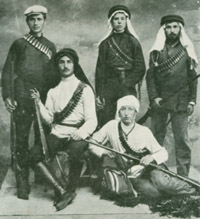 |
Awarded to
all who were members of Hashomer between the years 1909 and 1920.
In case the eligible person died, a member of his
family (husband, wife, parent, brother, sister, child or grandchild) may
request to receive the ribbon.
Presentation of the ribbon started in 1981. Look here
for samples of the award document
|
|
|
 |
Nili Ribbon |
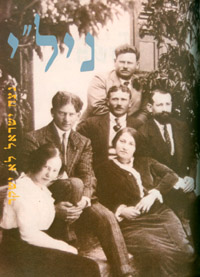 |
Awarded to
all who were members of
Nili
between the years 1915 and 1917.
In case the eligible person died, a member of his family (husband, wife,
parent, brother, sister, child or grandchild) may request to receive the
ribbon.
Presentation of the ribbon started in 1981. Look here
for ribbon versions, the award document and the award
ceremony |
|
 |
Haganah Ribbon
(Haganah
- self defense) |
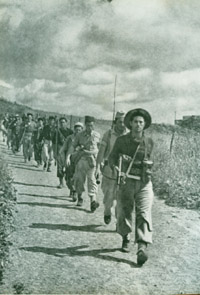 |
Awarded to:
a) those who were members of the Haganah organization for a period of at
least six months between 1920 and the Day of Independence of Israel.
b) all members of the Haganah who were killed, wounded, arrested or took
part in operations.
In case the eligible person died, a member of his
family (husband, wife, parent, brother, sister, child or grandchild) may
request to receive the ribbon or replacement of lost or worn ribbon.
Presentation of the ribbon started in 1958.
Look here for
details of the award ceremony and the
award document
and
ribbon versions |
|
 |
Etzel Ribbon (Irgun
Zva'i Leumi - National Military Organization) |
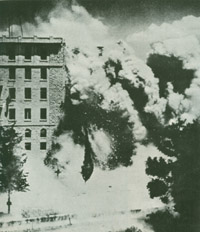 |
Awarded to:
a) those who were members of
Etzel for a period of at
least six months between 1937 and the Day of Independence of Israel.
b) all members of the Etzel who were killed, wounded, arrested or took
part in operations.
In case the eligible person died, a member of his
family (husband, wife, parent, brother, sister, child or grandchild) may
request to receive the ribbon or replacement of lost or worn ribbon.
Presentation of the ribbon started in 1979.
Look here for
the award document. Look here for details
of the award ceremony. |
|
 |
Lehi Ribbon
(Lohamei
Herut Israel - Freedom Fighters of Israel) |
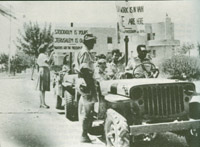 |
Awarded to:
a) those who were members of Lehi for a period of at
least six months between 1940 and the Day of Independence of Israel.
b) all members of the Lehi who were killed, wounded, arrested or took part
in operations.
In case the eligible person died, a member of his
family (husband, wife, parent, brother, sister, child or grandchild) may
request to receive the ribbon or replacement of lost or worn ribbon.
Presentation of the ribbon started in 1980.
Look here for the award
documents. |
|
 |
Volunteers Ribbon |
|
 |
| Ben Gurion (r.) and Ben Zwi in
uniform
of the Jewish Legion, WWI |
|
Awarded to:
a) volunteers in the
Jewish Legion during the First
World War.
b) Israeli citizens or those who during permanent
residency in Palestine, during the First World War, upon demand of the
national Jewish institutions volunteered to serve in the
Turkish army.
c) citizens or permanent residents of Israel who
during the Second World War,
voluntarily served in the
British army before 8.11.1944. In case the
voluntary service started on or after this date, a minimum period of 6
months service is required. (Any citizen who voluntary served in the British army
during the Second World War is also entitled to the Fighters against Nazis Ribbon)
In case the eligible person died, a member of his
family (widow, parent, brother, sister or child) may request to receive
the ribbon or replacement of lost or worn ribbon.
Presentation of the ribbon started in 1961.
Look here for
the award document and
ribbon versions. |
|
 |
Mishmar (Guards) Ribbon |
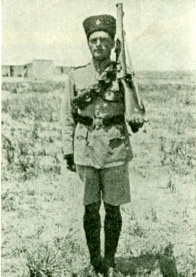 |
Awarded to citizens or permanent residents of Israel who,
between 1936 and 1939, during a period of at least six
months served in one of the following organizations:
a) the Jewish Settlement Policeb)
Special
Night
Squads
c) Notrut guard units
d) Palestine Police
e) Supernumery Palestine Police
Regarding the three last organizations, the condition
exists that the enlistment was approved by the national Jewish
institutions. In case the eligible person died, a member of his family
(widow, parent, brother, sister or child) may request to receive the
ribbon or replacement of lost or worn ribbon.
Presentation of the ribbon started in 1963.
Look here for a picture of someone
wearing this ribbon. Look here for
the award document.
Look
here for the program of the Notrim award ceremony held in Tel Aviv
at January 29, 1964 |
|
 |
Fighters against Nazis Ribbon |
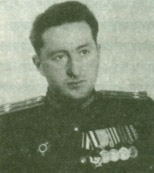 |
Awarded to citizens or permanent residents of Israel who, during
the Second World War participated in the fight against the nazi enemy and
his aids, as a soldier in the Allied Forces, including the Jewish Brigade
Group in the British army, as a
partisan or as a member
of an underground resistance group, in the period between 1 September 1939
and 1 September 1946, as by Yad Vashem regulation of 1968 and the Law on
the Second World War Veterans of year 2000.
In case the eligible person died, a member of his family (husband, wife,
parent, brother, sister, child or grandchild) may request to receive the
ribbon or replacement of lost or worn ribbon.
Presentation of the ribbon started in 1967. The
document states that the ribbon may be worn on Independence Day and
official occasions.
Look here
for details of the award ceremony and the
award document,
here is a picture of someone wearing this ribbon.
|
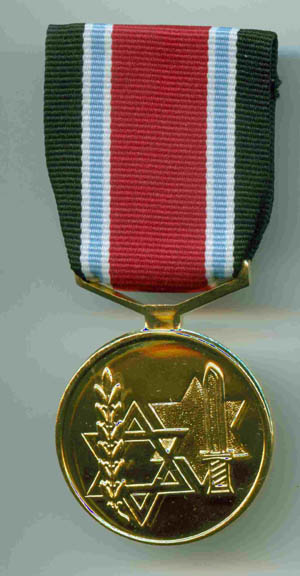 |
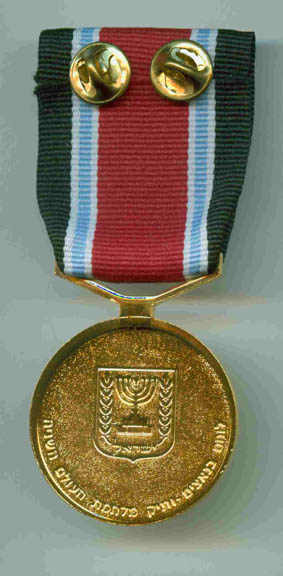 |
The medal that was instituted after the ribbon. On the back
appears the symbol of the State of Israel and the text: Fighter against
the Nazis - veteran of the Second World War. |
|
|
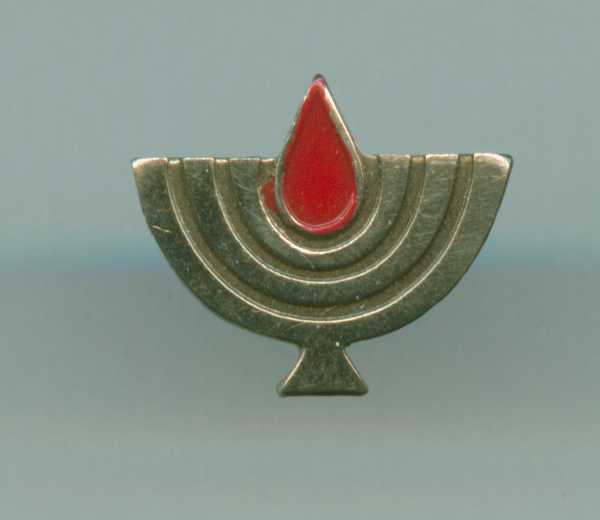 |
Decoration of State Warriors
(for civilian wear) |
| |
Awarded to members of military or paramilitary
organizations who fought for the establishment of the state of
Israel, from haShomer in 1909 till the independence of Israel. The ministerial committee for symbols and ceremonies
decided that requirement of eligibility to the decoration is service
during at least six months in any of the following organizations or
frameworks:
a) Hashomer
b)
Nili
c)
Haganah
d)
Etzel
e) Lehi
f)
all the organizations dealing with immigration (ha'apala)
g)
guards (Notrut) and volunteers to the police force of the mandate
government
h)
Jewish battalions in the First World War
i)
soldiers of the Allied Forces, underground fighters, partisans, ghetto
fighters, resistance fighters in concentration camps during the Second
World War.
j) Machal -
Overseas Volunteers
and Gachal - drafted new immigrants. For these two groups, no minimum time
limit applies.
In case the eligible person died, a member of his family (husband, wife,
parent, brother, sister, child or grandchild) may request to receive the
decoration or replacement of lost or worn decoration. Presentation of the decoration started in 1968.
Look here
for pictures of the award ceremony and the
award document. The decoration consists of a nickel pin, height 13 mm,
width about 15 mm and slightly larger than the
similar badge mounted on the War
of Independence Ribbon. |
|
|
|
|
|
|
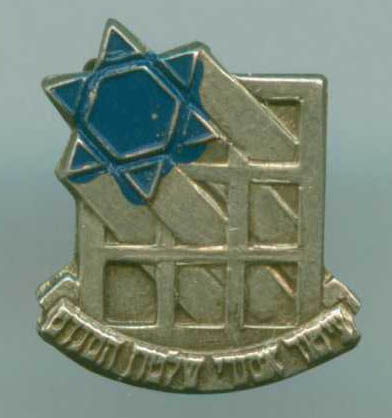 |
Mandate Prisoners Decoration
Awarded to anyone who was arrested or
jailed by the British authorities because of his activity or membership of
one of the underground, military or paramilitary organizations that took
part in the struggle against the British rule in the land of Israel during
the period before the establishment of the State of Israel, and who
because of this service was in prison for a period of at least six months. |
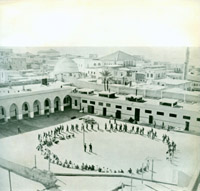 |
In case the eligible person died, a
member of his family (husband, wife, parent, brother, sister, child or
grandchild) may request to receive the decoration or replacement of lost
or worn decoration.
Presentation of the decoration started in 1984.
The decoration consists of a nickel badge, height and width
about15 mm.
Look here for
the award document. |
|
|
|
 |
Israel Security Award named after Eliyahu Golomb
The highest possible decoration, not for a single heroic battle action but
for outstanding contributions to the security of Israel..
Awarded by the Minister of Defense. The award, instituted in 1958 and named after the
founder of the Haganah, Eliyahu Golomb,
is granted yearly around Independence Day.
The decoration consists of a pin, height and width
about15 mm. There exist 3 versions of the pin, for first,
second and additional wards.
The goal of the award is to
encourage researchers, engineers and other personnel of the security
services as well as civilian scientists to contribute in their work to the
security of Israel. Any
civilian or serviceman who considers himself eligible to the award may
propose his candidacy. The award can also be granted to groups of up to 8 people.
Maximum 2 awards may be granted for the development of weapons or defense
systems that entered operational service. One award may be granted for
life achievement.
It is not possible to
gain the award twice within 5 years. For reasons of security
not all the details of the winning projects and names of
awardees are published and the award ceremonies are only
partially covered by the media. Up till the year 2002 642
awards were granted to 705 persons, among this 10 times for
life achievement. Look here for
pictures
of recipients and award ceremonies. In the order of wearing decorations,
this decoration is ranked first. |
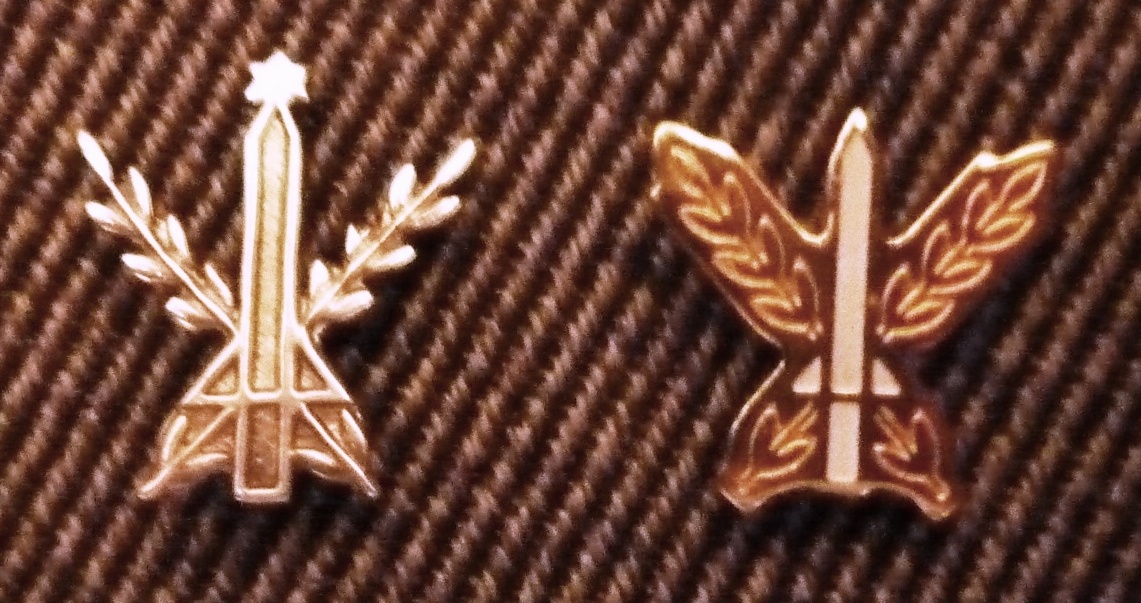 |
|
Twice awarded |
First time award |
|
|
|
Sources:
https://www.mod.gov.il/Citizen_Service/clalim/otot/Pages/Service_Ribbons.aspx
https://www.mod.gov.il/Citizen_Service/clalim/otot/Pages/decorating.aspx |
|
|
|












